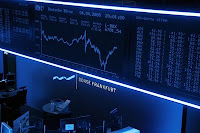What is a Stock?
Posted by
Lemizeraq
Labels:
long term investing,
stocks and shares

A stock is basically a share of ownership of a company. So if you buy a common share of a company, you are entitled to vote in corporate decisions. The common share is what we, the general public, buy on the open market.
The other type of share, a preferred share basically does not offer voting rights but instead pays out dividend to the holder of a preferred share first before the common share holder. These are open mainly to institutional buyers, governments or high net worth individuals.
Many new financial instruments are derived from the underlying value of a stock. So these are often called derivatives and they include futures and options.
From a company's perspective, issuing stocks to the general public and large institutions is a way to raise capital for expansion. This capital raised supplements and often exceeds the amounts that the company can borrow from banks.
The company would then decide if it should channel profits that they make to their shareholders through a dividend, where a proportion of the profits is distributed to all shareholders, preferred and common.
At times, a company may decide to withhold the dividend or pay a smaller dividend, for example in recessionary periods where all companies need more working capital and cash buffer to guard against defaults in payment by customers.
Also instead of paying dividends, some companies may decided that they want to use it for capital investment to buy more equipment or use the profits earned to go global and the shareholder benefit from higher share prices in future when the company earns greater profits.
For the investor or shareholder, the stock's gyrations and movement can induce heart attacks. Witness the fall of the Citibank stock from over $50 to less than $1 and then back up to $3 recently.
The share prices is determined by market forces of supply and demand. When the company does well and profits are high, more shareholders want to keep the stock and participate in current and future dividends or increases in the prices. At the same time, other investors become more willing to buy the stock. With a decrease in profits, the reverse happens.
However, there are more than just the performance of the company that decides the price of the stock. News of higher oil prices, disruptions in supply of raw materials etc. will affect the price of the share.
The overall market conditions affect the price of the share also as psychological factors comes into play too. When it is a bull market and share prices of many companies are increasing, greedy investors bid up the prices of the stock. In a bear market, fear takes over and the investors sell their stocks even if the company may be doing well.
A newly listed stock, is called a stag, if it is termed to be a hot IPO (Initial Public Offering). There is often a wild rush to get hold of a few shares of a IPO which analysts predict will shoot through the roof. Something like Microsoft, although it was not that hot an IPO compared to the dot com IPOs.
 The world's most expensive stock is the vehicle of a good friend of the nerdy guy you see on the front row extreme left. Berkshire Hathaway the holding company of investor extraordinare Warren Buffet is worth $84,817.00 a share in the midst of a serious recession.
The world's most expensive stock is the vehicle of a good friend of the nerdy guy you see on the front row extreme left. Berkshire Hathaway the holding company of investor extraordinare Warren Buffet is worth $84,817.00 a share in the midst of a serious recession.I leave you with a chart which shows clearly the benefits of long term share investment:

$1 in stocks in 1801 becomes $8.8 million in 2001.
Related Posts
Subscribe to:
Post Comments (Atom)
Disclaimer
reliance placed on information provided in the blog.
Shares and financial instruments illustrated in this blog can go down sharply or in certain instruments suffer total loss on the initial investments. Investors are advised to make their own judgment on the information provided and consult their own financial advisors or consultants as to the suitability of the products illustrated to their particular financial needs and objectives before acting on any information contained herein in this blog.



Post a Comment